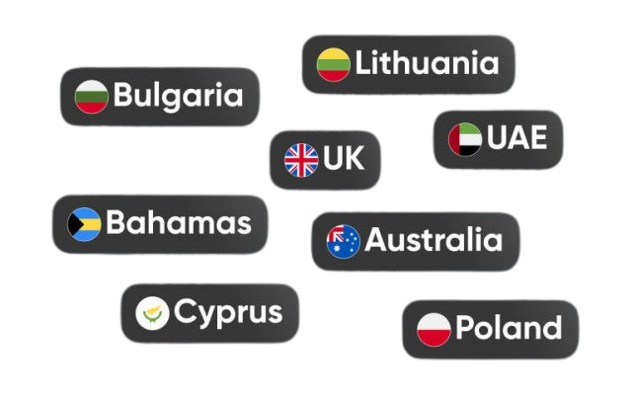
Overview

Forex

Crypto

Shares

Indices

Commodities
Forex Markets
Barclayex offers a wide range of more than 70 forex currency pairs with high levels of liquidity
What Are Forex Currency Pairs?
In the forex market, trading consists of the purchase or sale between two different currencies. These combinations of currencies are referred to as currency pairs. Exchange rates are the relative price of currency pairs when compared to each other. There are seven major currency pairs, all of which include the US dollar.
Established in 2014
Over 100k+ Clients Worldwide
15,000+ Markets
What is Forex Trading?
Forex trading is the buying and selling of currency pairs in the world’s largest financial market. Traders aim to profit from the price differences between currencies, which are influenced by global economic events, market sentiment, and interest rates. With a daily trading volume exceeding $6 trillion, the forex market is known for its high liquidity and continuous, 24-hour trading schedule.
Why Trade Forex?
Forex trading offers unmatched liquidity, flexibility, and the chance to profit in both rising and falling markets. Open 24 hours a day, five days a week, it’s accessible for traders around the world and provides opportunities to respond to global market events in real-time. Forex is an ideal choice for those seeking diverse trading strategies and high market accessibility.
Why Trade Forex with Barclayex.ai?
Our platform offers competitive spreads, rapid execution, and advanced tools designed to enhance your trading experience. We provide a reliable trading environment with real-time insights, dedicated support, and resources to help you navigate the forex market with confidence. Choose us to make your trading experience both seamless and rewarding.
Why Trade with Barclayex

Fully Regulated Brokerage
We’re licensed and fully compliant across multiple jurisdictions to ensure the highest levels of integrity

Advanced Trading Tools
Cutting-edge trading tools developed by an in-house team to drive the success of traders at all levels

Multi-Asset Platform
Trade over 15,000 instruments covering shares, crypto, forex, commodities and more

Experience Driven Innovation
Barclayex product developers aren’t just technical experts – they're traders who’ve been in the trenches themselves

Flexible Leverage Options
Choose leverage that suits your trading style, helping you maximize returns while managing risk

Secure Payment
Enjoy fast, secure transactions with fully encrypted payment methods protecting your funds
How to Get Started


Register


Verify


Fund


Trade
Global Awards
Discover the recognition Barclayex has achieved through numerous global awards.

Best Trading Experience 2016

Best Multi-Asset Broker Europe 2020

Best Partnership Programs 2020

Best Customer Support 2021

Most Innovative Team 2023
Amplify Your Trading Edge
Enhanced with Cutting-Edge Charting
Join Barclayex today and qualify for up to $500 in bonuses
Receive up to 10% cashback on every transaction
* See our Account Types and Bonuses here.
Forex Trading FAQ
How does economic data impact Forex prices?
Economic indicators like GDP, employment reports, inflation, and interest rates are closely watched in Forex markets. For example, higher-than-expected inflation could prompt a central bank to raise interest rates, strengthening that currency as investors seek better returns. Conversely, disappointing economic data can weaken a currency as investors anticipate slower growth.
What role do central banks play in Forex markets?
Central banks influence Forex markets through monetary policies, such as setting interest rates, buying or selling foreign reserves, and implementing quantitative easing. For instance, when a central bank raises interest rates, the currency often strengthens because higher rates attract foreign investors seeking returns.
How can geopolitical events affect Forex trading?
Geopolitical events like elections, trade wars, or military conflicts can cause significant volatility in Forex markets. Such events create uncertainty, prompting traders to either flock to safe-haven currencies (like USD, CHF, or JPY) or pull out of riskier currencies.
What is the impact of currency intervention by central banks?
Some central banks actively intervene in Forex markets to stabilize their currency. For instance, the Swiss National Bank has intervened to keep the Swiss franc from appreciating too quickly, as a strong currency could harm exports.
How does liquidity affect Forex trading?
Forex markets are known for high liquidity, but liquidity can vary depending on the time of day and the currency pair. Major pairs like EUR/USD have higher liquidity, while exotic pairs may have less liquidity, resulting in wider spreads and more volatile price movements.
What are the risks of high leverage in Forex trading?
High leverage can magnify both profits and losses. For example, a small market move can lead to substantial gains if leveraged effectively, but it can also lead to large losses, possibly exceeding the trader’s initial investment. Proper risk management is crucial when using leverage.
Tell: +44 863-81-0273

Address: Christoffelgasse 6 Bern, 3011 Switzerland
Copyright © 2014-2025



